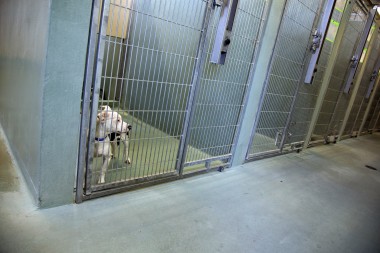Knee-high to pedestrians just inches away, a wandering dog travels a Bourbon Street sidewalk on a recent Saturday night, companionless. On this night, it may not have shelter, but it’s alive.
Stray dogs like this one are likely to be picked up by animal control officers from The Louisiana Society for the Prevention of Cruelty to Animals, which has a contract with the city. The society’s facility can handle 131 dogs at any one time, with only 27 offered for adoption. This means euthanasia for many.
In fact, the shelter gets the most strays from June through September, when as many as 600 dogs come in every month to the society’s shelter on Mardi Gras Boulevard, according to Ana Zorrilla, chief executive of the society.
Animal calls and pickups occur the most frequently from the Lower Ninth and Upper Ninth Wards, Gentilly and Mid City, Ms. Zorrilla said. When the shelter becomes overpopulated, even healthy, adoptable dogs become candidates for euthanization.
Ms. Zorrilla is left to answer the tough question: Who lives and who dies?
A total of 50 dogs were put down due to a lack of space in 2013, Ms. Zorrilla said.
“When I say space, I mean they were healthy. They were sweet. There’s nothing wrong with them,” Ms. Zorrilla said. “We just don’t have room on that given day. We have more animals coming in and need to make space for them.”
Society officials would not say how many more dogs have been euthanized for reasons other than space, including temperament and health. Communications Director Alicia Haefele said she did not feel comfortable releasing the information because it is sensitive and could be misinterpreted.
“If a dog shows human aggression or animal aggression, those are the ones we will always euthanize,” Ms. Zorrilla said. The LA-SPCA has been euthanizing by injection for the last 30 years.
That shouldn’t have to take place at all, according to Nathan Winograd, the executive director of the No Kill Advocacy Center, a national organization based in Oakland, Calif. Mr. Winograd, who came to New Orleans for a time after Katrina to help with animal rescue, said New Orleans should try to have more animals adopted. The animal advocacy center, founded by Mr. Winograd in 2004, is dedicated to making the country a “no-kill” nation.

“While about 2.7 million animals are killed every year in the U.S. because they lack a home, well over 25 million people add a new dog or cat to their home every year,” he said. “If shelters did a better job of competing with our sources of animals and kept animals alive long enough to get into homes, they would not be killing.”
Ms. Zorrilla said the society does offer other services, including adoption, spay and neutering, educational programs and outreach to low-income areas where numbers of strays tend to be highest.
“For me it’s not about the rhetoric or using the language ‘no kill’ to incite emotion as much as it’s about about boots on the ground work and making a difference in the community,” Ms. Zorrilla said.
The society in the last three years has dramatically reduced euthanizations by transporting animals to other facilities, Ms. Zorrilla said. According to the society’s website, “these highly adoptable animals are not at risk of being euthanized because of capacity constraints.”
Ms. Zorrilla estimates the cost for transport at $4,000 to $5,000 for 40 to 50 animals. “It’s a lot of money we’re putting in to save animals and moving them up north, for adoption,” she said.
According to Ms. Zorrilla, breeds like pit bulls are a major part of the shelter’s overpopulation. “We see a lot of pit bulls and pit bull mixes,” she said. “They are harder to place.”
With the pit bulls’ chances for placement low, if they are not transferred or adopted they become more likely candidates for euthanasia. Most of the 50 dogs euthanized for space last year were pit bulls, Zorrilla said.
Other animal facilities in the state deal with similar situations. In 2011, the Ouachita Parish animal shelter caught the public’s eye when it announced that it was taking in more animals than it could handle and had to euthanize them, according to a report by KNOE-TV, a Monroe, LA station. The shelter director told the station that about 7,000 dogs were euthanized there in 2010.
David Kirkpatrick, who is the media relations manager for the American Veterinary Medical Association, agrees animal shelters in Louisiana are overcrowded.
“Many would say that there are too many dogs because too many of them are relinquished,” he said. “And they end up being euthanized because they can’t find homes.”